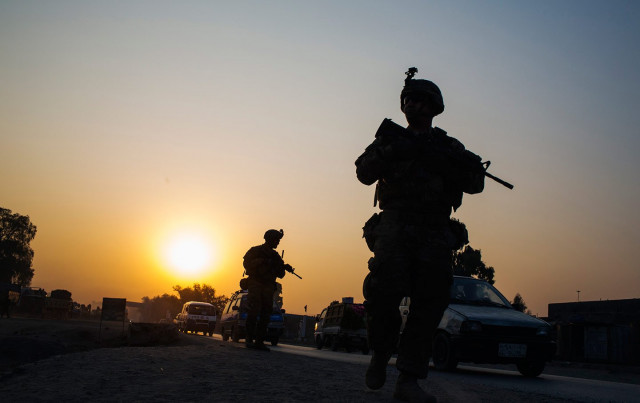Pakistan in diplomatic push to salvage Afghan peace deal
Officials say country in touch with all stakeholders to find a way out of current impasse

A Reuters file photo of US soldiers in Afghanistan.
Earlier this week, US President Donald Trump stunned the world with his announcement on Twitter that he was all set to meet the Afghan Taliban leaders at Camp David as well as President Ashraf Ghani as part of efforts to strike a peace deal.
He; however, had to cancel the would-be secret meeting with the Taliban leaders after the group claimed responsibility for a recent attack in Kabul that among 11 others also killed an American soldier.
Trump also called off the Afghan peace talks, which both the US and the Taliban earlier said almost paved the way for a deal.
In fact, a draft agreement had already been reached between the two sides.
But with the sudden cancellation of talks at Camp David, the entire process had now collapsed.
Pakistan, which had facilitated the nine rounds of talks between the US and the Afghan Taliban, was concerned about the stalemate and now quietly began efforts to rescue the faltering peace deal.
Two senior officials with the knowledge of the diplomatic maneuvers told The Express Tribune that Pakistan was in touch with all ‘stakeholders’ to find a way out of the current impasse.
One positive development, noted the officials, was the decision by President Trump to fire his National Security Adviser John Bolton. Officials here believed that Bolton, who was known for his hawkish stance, was lobbying against striking the peace deal with the Taliban.
“Bolton’s sacking means that President Trump is still willing to opt for the peace deal in Afghanistan,” observed a Foreign Office official, who spoke on condition of anonymity.
He said relevant authorities were currently engaged with the US as well as Qatar, which hosted the Taliban’s political office, to help revive the peace process.
Pakistan was believed to be using its ‘leverage’ to convince the Taliban for reducing violence in Afghanistan.
“We have been urging all sides to show restraint. If there is no possibility of a ceasefire at this stage, all sides at least can work towards reducing the level of violence,” the official further said.
Although Trump cited the killing of American serviceman as a reason for the cancellation of the peace process, independent observers believed there might be other reasons too. One of those reasons included the Taliban’s unwillingness to commit to a ceasefire. Trump, observers think, pulled out of the talks in a bid to enhance the bargaining position of the US in talks with the Taliban. The Trump administration now wanted the Taliban to commit to a ceasefire if they were interested in any peace deal.
The insurgent group, though, agreed not to target foreign forces once the deal was signed but left the ceasefire issue to be debated during the intra-Afghan dialogue.
At the weekly news briefing, Foreign Office spokesperson Dr Muhammad Faisal said Pakistan wanted all sides to “exercise restraint and refrain from violence”.
“We have encouraged and facilitated the Afghan peace process in good faith and as a shared responsibility,” Dr Faisal told reporters. “We shall continue to monitor the situation and urge all parties to return to the negotiation table to take the progress achieved in the talks, so far, to its logical conclusion.”
The spokesperson also reiterated Pakistan’s stance that the only solution to the Afghan conflict lied in a politically negotiated settlement led and owned by the Afghans themselves.
“A military-focused approach has failed to render the desired results,” he stressed.
“We remain hopeful that the peace talks between the US and the Afghan Taliban will be resumed at the earliest and the process will lead to intra-Afghan negotiations which are imperative for finding durable and sustainable peace in Afghanistan. We hope that the momentum, so generated, will be maintained by the international stakeholders for a peaceful outcome in Afghanistan,” said Faisal.



















COMMENTS
Comments are moderated and generally will be posted if they are on-topic and not abusive.
For more information, please see our Comments FAQ